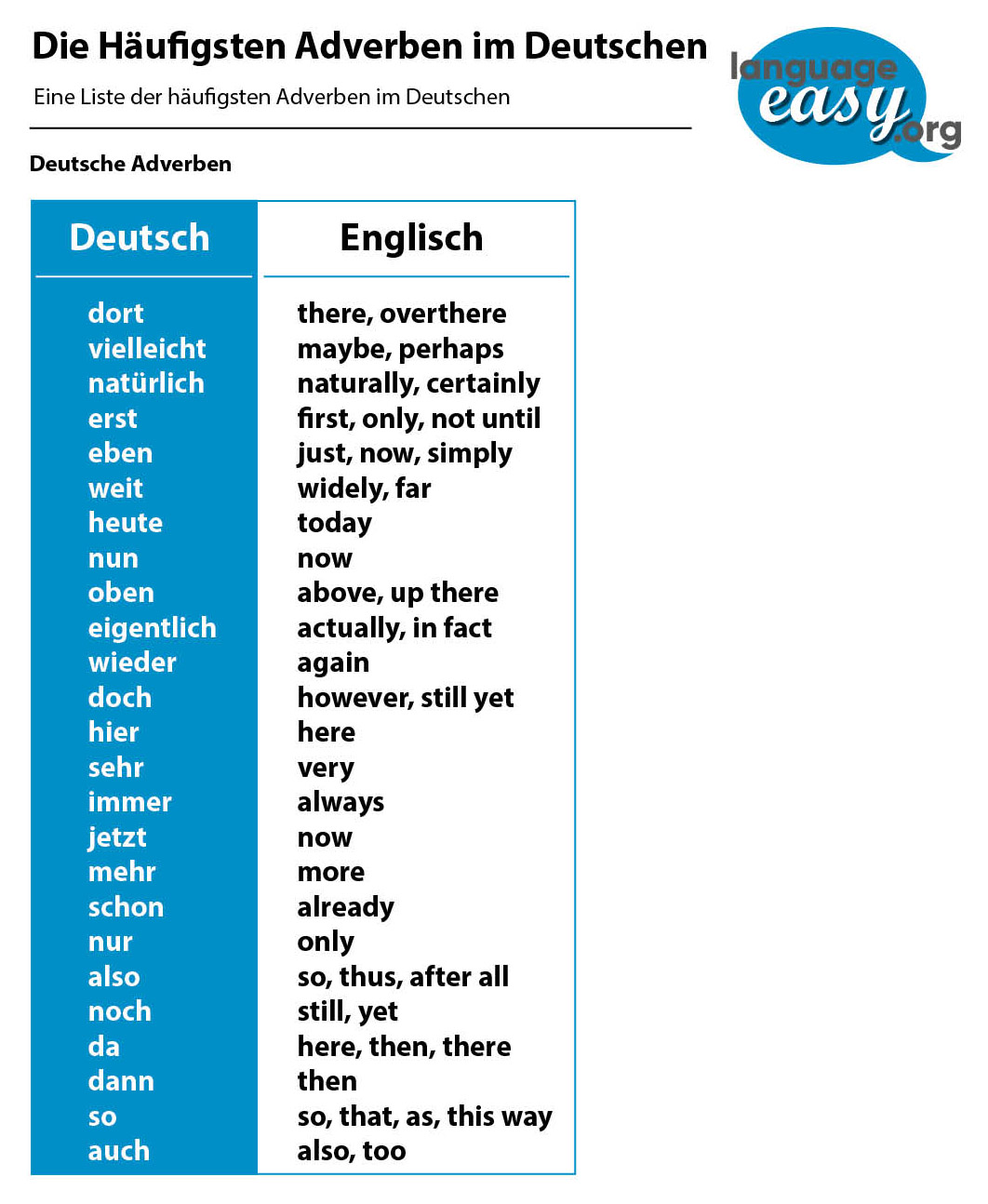German Adverbs
Adverben im Deutschen – Erklärungen und Beispiele
German Adverbs – Summary
Zusammenfassung
Adverbs are words which describe verbs, and they generally follow the verb. They also contribute to the meaning of a sentence. Adverbs are not declined. In some cases, they can even describe other adverbs.
- “Der Hund läuft schnell. Der Hund läuft sehr schnell.”
- “Das Pferd isst viel. Das Pferd isst nicht viel.”
Adverbs are often combined with prepositions, which refer either to the dative or the accusative object.
- Dative object: “Sie lebt frei von Gluten.”
- Dative object: “Sie sind fertig mit der Aufgabe.”
- Accusative object: “Er ist eifersüchtig auf sie.”
- Accusative object: “Dieses Werkzeug ist nützlich für die Gartenpflege.”
Local Adverbs
- Place: “da, dort, hier, außen, draußen, drüben, drinnen, innen; oben, unten, mitten, vorn, hinten, links, rechts”, …
- Destination: “dahin, dorthin, hierhin; hinein, hinaus, hinunter, hinüber; aufwärts, abwärts, vorwärts, rückwärts, seitwärts; nach oben, nach unten”, …
- Origin: “daher, dorther, hierher; von oben, von unten”, …
Temporal Adverbs
- Time: “heute, jetzt, gerade; morgens, mittags, abends, nachts; gestern, früher, einmal, damals; seither, inzwischen; morgen, bald, demnächst, nachher, später”, …
- Frequency: “immer, meist(ens), manchmal, selten, nie, niemals”, …
Modal Adverbs
The modal adverbs indicate the kind of way or the intensity in which something happens.
- reinforcing (“sehr, besonders”, …) corroborative (“sicher, gewiss”, …)
- alleviative (“kaum, fast”, …) negating (“nicht, umsonst”, …)
Once you have reached a certain level of German language skills, you won’t be able to avoid a crucial part of German Grammar. Exactly, I am talking about German adverbs. Of course, you all already know what German adverbs are, but, just in order to refresh your mind, here is the definition out of the good old Cambridge dictionary:
“A word that describes or gives more information about a verb, adjective, adverb, or phrase”
Of course, this is only a definition of the term. But what is the real significance of German adverbs? Well, like adjectives, adverbs describe the world around us – they make actions more spicy, they add texture to the stories that occur from day to day. Actually, you can’t say that your German is excellent without mastering German adverbs.
So, after you have passed for the basic parts of the German language, let’s start to customize your spoken language by learning some more about German adverbs!
First of all, we need to structure German adverbs. Actually, you can divide them into three big groups:
- German adverbs of time, which describe the time of the action and its frequency;
- then we have German adverbs of manner, describing in what way an action was completed;
- and German adverbs of place, which describe where an action occurred
- aaaaaaaaand, there are also adverbs of frequency, interrogative adverbs and causal adverbs.
So, as we cleared up some basics and the structure of adverbs, let’s go for some more detailed explanation and some examples for these three types of German adverbs.
German Adverbs of Time
Deutsche Adverbien der Zeit
At first, we will talk about German adverbs of time. As you already know, these adverbs describe when and how frequently an action takes place. So, the only thing of real importance here is the word order. Here, the adverbs have their position most often at the beginning of a sentence. Logically, we need some examples to illustrate that. So, here is a list of German adverbs of time for you.
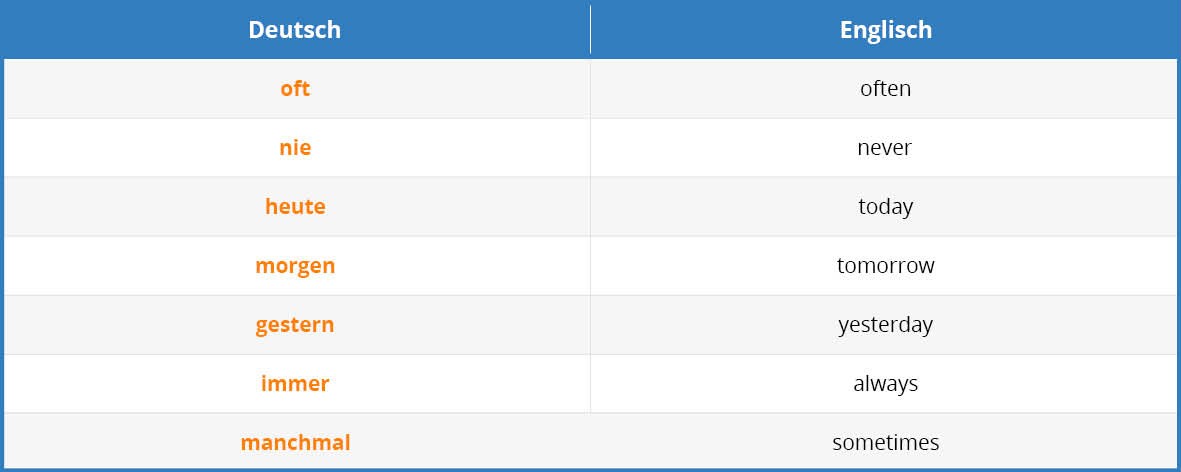
After learning some vocabulary, let’s use it in some sample sentences.
- “Manchmal esse ich zwei Schnitzel, aber nie esse ich drei.”
– Sometimes I eat two Schnitzels, but I never eat three. - “Vormittags gehe ich in die Schule, aber abends bin ich zu Hause.”
– In the morning I go to school, but in the evening I am at home. - “Heute ist ein schlechter Tag, aber morgen kann es nur besser sein.”
– Today is a bad day, but tomorrow it can only be better.
Well, I think it is quite clear how to use German adverbs of time. Nevertheless, there can be a change in the word order. So, here is an example for that.
- “Oft muss ich weinen.” – Often I have to cry.
- “Ich muss oft weinen.” – I have to cry often.
Whether you use “oft” at the beginning of the sentence or at the third position, depends on how much you want to emphasize the time or frequency of the action. So, when “oft” is put at the beginning, you emphasize it, when in third position, you don’t.
German Adverbs of Frequency
Deutsche Adverbien der Häufigkeit
In the following, we will have a look at list of different adverbs of frequency.
Adverbs of Absolute Frequency
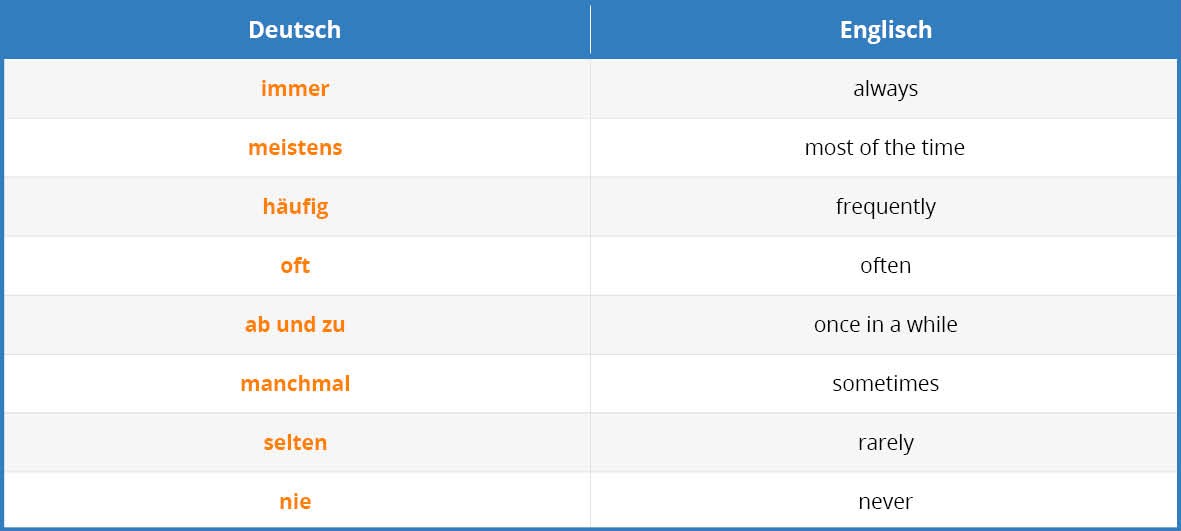
Adverbs of daily frequency

Adverbs of weekly frecuency
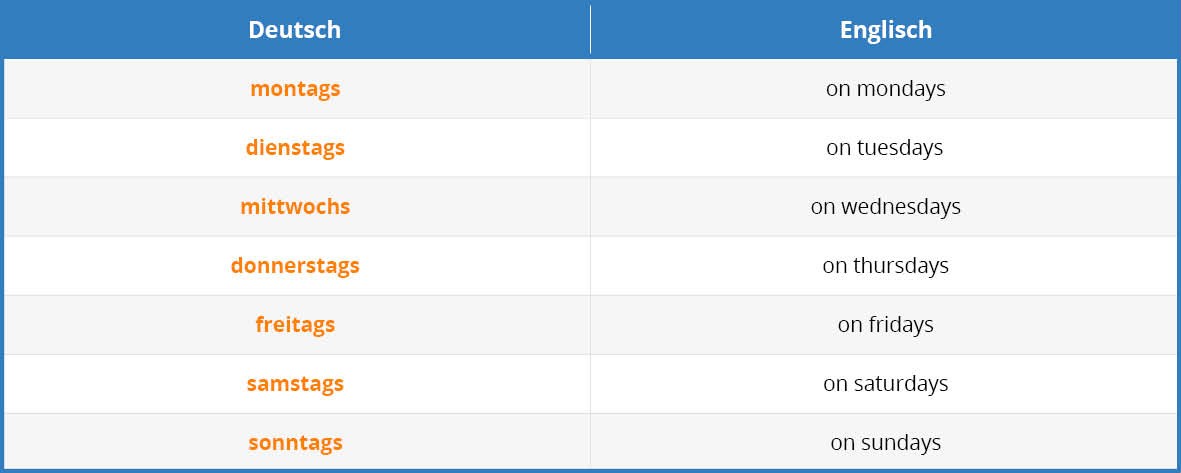
Other adverbs of frequency

German Interrogative Adverbs
Deutsche Interrogativadverbien
The most important interrogative adverbs are:

German Causal Adverbs
Deutsche Kausaladverbien
Causal adverbs indicate the reason or origin of an action.

Causal adverbs serve as a connection between two sentences, given that they’re “Konjunktionaladverbien”.
- “Ich möchte in Österreich arbeiten, deshalb lerne ich gerade Deutsch” – I would like to work in Austria, therefore I am learning German
It must be emphasized that adverbs occupy a position and by placing them at the beginning of a sentence, they move the subject to the 3rd position.
Adverbs of Manner
Deutsche Adverbien von Art und Weise
Now, let’s talk about German adverbs of manner. As you already know, these adverbs describe the emotion or the condition of an action. Logically, we need some examples to illustrate that. So, here is a list of German adverbs of manner for you.
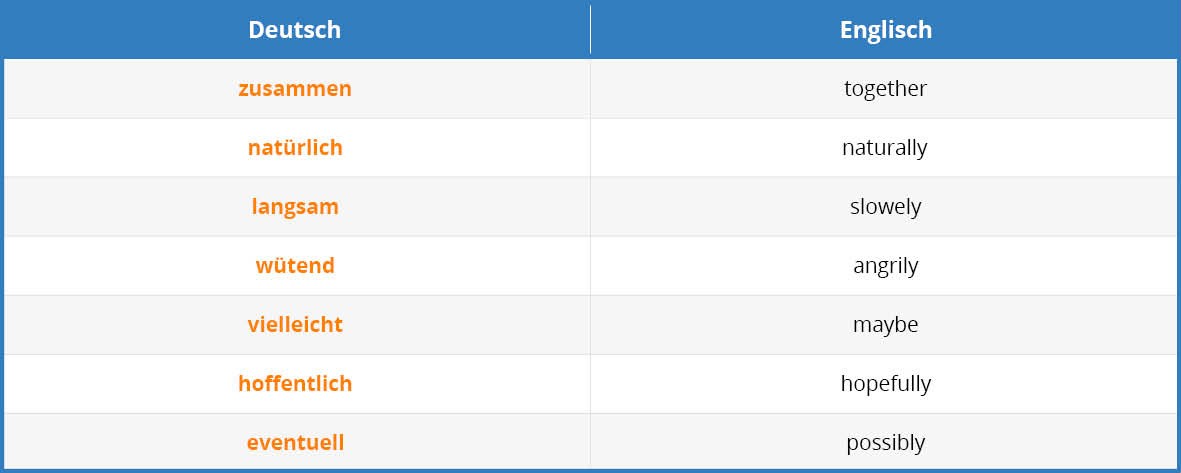
And here are some sentences where we apply our new vocabulary.
- “Hoffentlich denkst du nicht, dass ich vielleicht dumm wäre.”
– Hopefully you don’t think that I might be stupid.
In this case, the phrase “Of course” might better express the intent. Just as “of course” symbolizes an action would usually not occur any other way. For example: “Of course, you have to wash you have after leaving the bathroom.”- “natürlich” exhibits the same properties.
Adverbs of Place
Deutsche Adverbien des Ortes
Now, we will talk about German adverbs of place. As you already know, these adverbs describe where an action takes place. So, it is quite important for you to learn these German adverbs, as describing the place of an action is as important as its time or condition. Logically, we need some examples to illustrate that. So, here is a list of place adverbs for you.
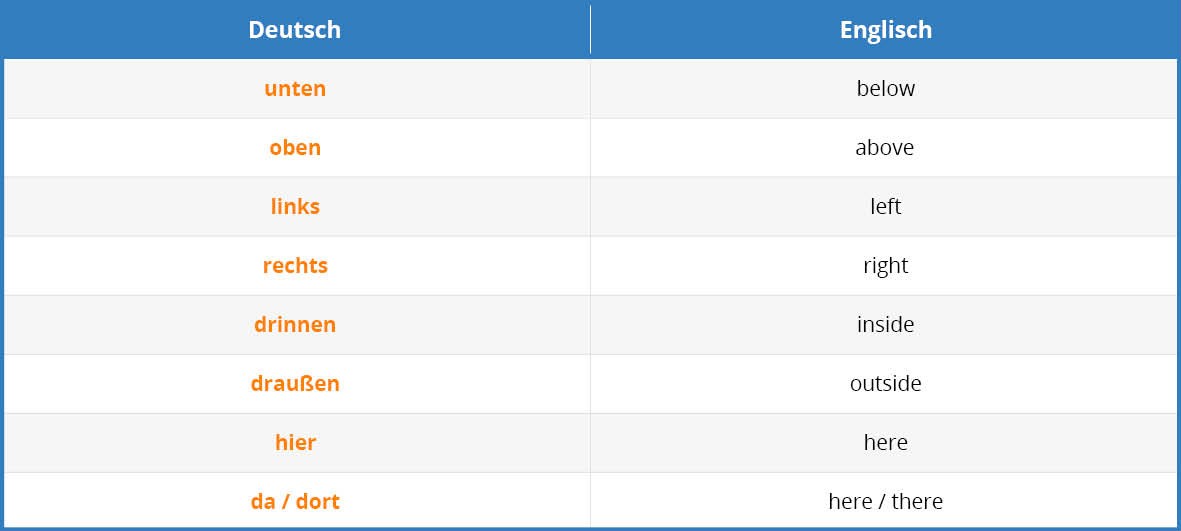
“Da” and “dort” are two important German adverbs, if you want to describe the location of an action. Always depending on the context, especially “da” can have a lot of different meanings. For example, if you point on something specific, it can mean “there”. But if you are in a certain spot and you use “da”, it can mean “here”. Well, here are some other sentences that shall serve you as examples to illustrate the use of German adverbs.
- “Fahren Sie weder nach links, noch nach rechts.”
– Don’t turn right, nor left. - “Geht nach draußen, wenn ihr spielen wollt.”
– Go outside if you want to play. - “Warten Sie dort, bis sie an der Reihe sind.”
– Wait there until it is your turn. - “Meine Freundin sucht unten nach mir.”
– My girldfriend is looking for me downstairs.
Some last Words and Exercises
Einige letzte Worte und Übungen
Finally, we have reached the last part of this article where you can prove the German skills you have just learned. In the following you will see some phrases that you should complete with the correct terms. Once you have filled all the gaps, just click on the “correct” button and you can see your errors and the correct results. Good luck and… auf Wiedersehen!

